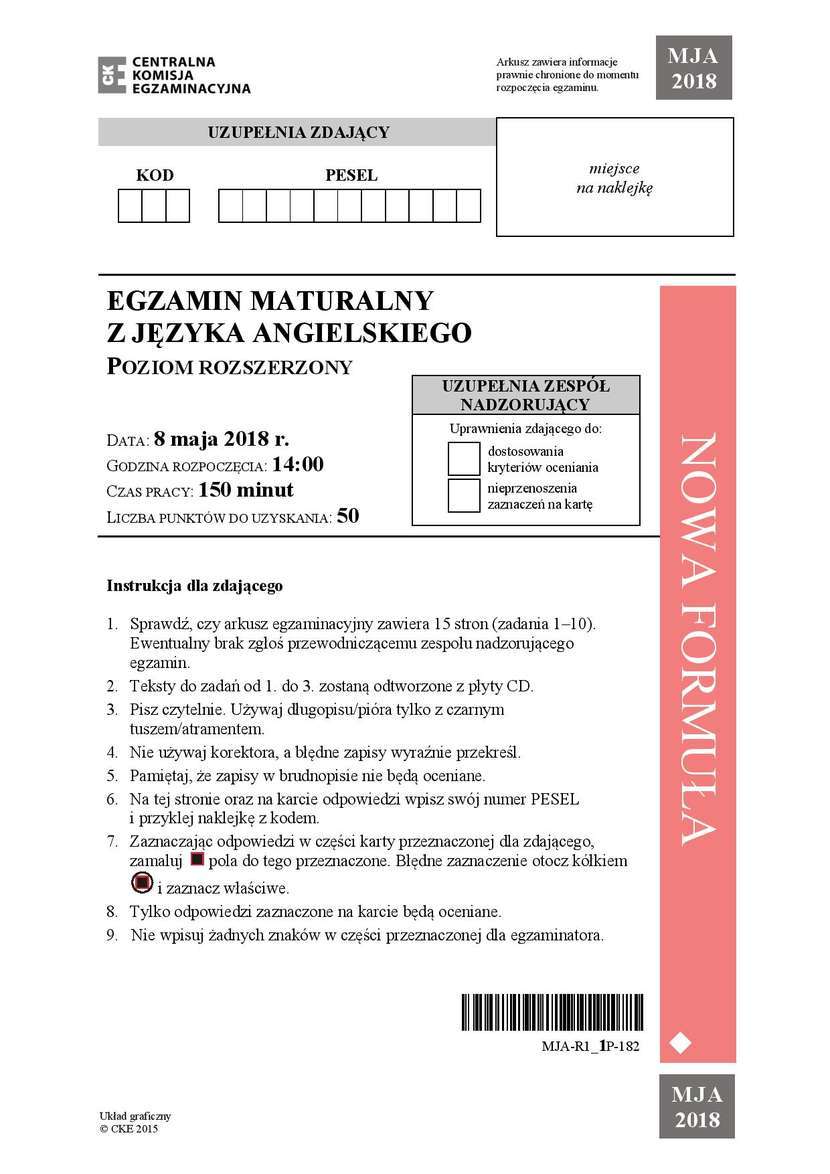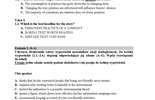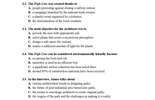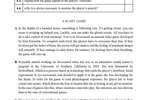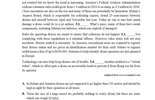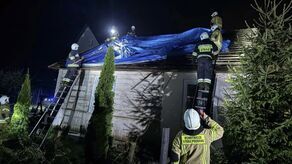
Zakończyła się już matura 2018 z języka angielskiego na poziomie rozszerzonym. Sprawdź swoje odpowiedzi z rozszerzenia z angielskiego, pobierz arkusze zadań z CKE.

Tradycyjnie język angielski był najczęściej wybieranym językiem obcym na maturze na poziomie podstawowym. Także na poziomie rozszerzonym zdawało go najwięcej uczniów, bo w całej Polsce aż 146 tys. maturzystów. To ponad połowa wszystkich osób, które wybrały na maturze 2018 jakiś przedmiot na poziomie rozszerzonym.
Matura 2018 z języka angielskiego na poziomie rozszerzonym zaczęła się o godz. 14. Maturzyści na napisanie testu mieli 150 minut.
Matura 2018 angielski rozszerzenie. Odpowiedzi, arkusze z CKE
Sprawdź w galerii zdjęć arkusze z matury rozszerzonej z angielskiego. Takie same można też znaleźć na stronie Centralnej Komisji Egzaminacyjnej. Czekamy na Wasze sugerowane odpowiedzi. Możecie je dodawać w komentarzach do artykułu.
Zadanie 1. (0–3)
Usłyszysz dwukrotnie trzy teksty. Z podanych odpowiedzi wybierz właściwą, zgodną
z treścią nagrania. Zakreśl jedną z liter: A, B albo C.
Tekst 1.
1.1. The man is calling
A. a travel agent’s.
B. a website administrator’s office.
C. a radio station.
ODPOWIEDŹ PRAWIDŁOWA C
Tekst 2.
1.2. Which of the following is stated in the text as an opinion, not a fact?
A. The consumption of potatoes has gone down due to changing diets.
B. Changing the way potatoes are advertised will influence buyers’ choices.
C. The majority of consumers are unaware they eat fewer potatoes.
ODPOWIEDŹ PRAWIDŁOWA B
Tekst 3.
1.3. Which is the best headline for the story?
A. DISHONEST PRACTICE OF A COMPANY
B. BORING TEXT WORTH READING
C. MISTAKE THAT COST $1000
ODPOWIEDŹ PRAWIDŁOWA B
Zadanie 2. (0–4)
Usłyszysz dwukrotnie cztery wypowiedzi uczestników akcji ekologicznych. Do każdej
wypowiedzi (2.1.–2.4.) dopasuj odpowiadające jej zdanie (A–E). Wpisz rozwiązania
do tabeli.
Uwaga: jedno zdanie zostało podane dodatkowo i nie pasuje do żadnej wypowiedzi.
This speaker
A. thinks that he/she convinced people that being eco-friendly saves money.
B. explains why wasting water is harmful to the environment.
C. alerted the authorities to a possible environmental threat.
D. quotes a figure which shows how effective his/her information campaign was.
E. recommends keeping a record of your eco-friendly activities.
2.1. E
2.2. A
2.3. C
2.4. D
Zadanie 3. (0–5)
Usłyszysz dwukrotnie wywiad na temat High Line, jednego z parków w Nowym Jorku.
Z podanych odpowiedzi wybierz właściwą, zgodną z treścią nagrania. Zakreśl jedną
z liter: A, B, C albo D.
3.1. The High Line is different from the other parks in New York because
A. it runs above street level.
B. it has a great variety of rare bushes.
C. it was constructed along a straight horizontal line.
D. it was built along a railroad track that had been demolished.
ODPOWIEDŹ PRAWIDŁOWA A
3.2. The High Line was created thanks to
A. people protesting against closing a railway station.
B. a campaign launched by the railroad track owners.
C. a charity event organized by celebrities.
D. the determination of the local residents.
ODPOWIEDŹ PRAWIDŁOWA D
3.3. The main objective for the architects was to
A. provide the area with appropriate soil.
B. select plants that create a mysterious atmosphere.
C. design a safe space for visitors.
D. ensure a sufficient amount of light for the plants.
ODPOWIEDŹ PRAWIDŁOWA C
3.4. The High Line can be considered environmentally friendly because
A. no paving has been laid out.
B. rainwater is used in an efficient way.
C. a significant carbon reduction has been noted there.
D. around 85% of construction materials have been recycled.
ODPOWIEDŹ PRAWIDŁOWA B
3.5. In the interview, James talks about
A. various architectural trends in designing parks.
B. the future of post-industrial sites turned into parks.
C. the means to encourage architects to create original parks.
D. the origins of the park and the challenges in making it a reality.
ODPOWIEDŹ PRAWIDŁOWA D
Zadanie 4. (0–4)
Przeczytaj tekst, który został podzielony na trzy części (A–C) oraz pytania go dotyczące (4.1.–4.4.). Do każdego pytania dopasuj właściwą część tekstu. Wpisz rozwiązania do tabeli.
Uwaga: jedna część tekstu pasuje do dwóch pytań.
In which paragraph does the author
4.1. provide an explanation of a term essential for understanding how the game
works? B
4.2. mention ideas for making use of the game in real life? C
4.3. explain how the game adjusts to the players’ reactions? A
4.4. refer to a device necessary to monitor the player’s anxiety? B
A SCARY GAME
A. In the depths of a haunted house, something is following you. It’s getting closer, you can
sense it creeping up behind you. Luckily, you can make the ghosts recede. All you have to
do is take control of your emotions. You’re in Nevermind, an unusual video game developed
by Erin Reynolds. To complete each level, the players have to overcome their fear. If they
let stress get the better of them, the screen will get shakier and the feeling of imminent danger
will intensify. If they manage to calm down, for instance, by slowing down their breathing,
the game will ease up.
B. Reynolds started working on Nevermind when she was in an interactive media master’s
program at the University of Southern California in 2009. She was fascinated by
biofeedback, which is a process based on technology that reads the player’s heartbeat, facial
expressions or eye movement, and decided to apply it in the game she was developing for
her thesis. In order for the game to read physiological responses, the player has to wear
a heart rate sensor, which detects the fear or tension that one is feeling at any given moment.
In the case of games like this, where emotions come into play, the outcomes are less obvious
than in the case of conventional games.
C. There has been a lot of talk in the video game industry about playing games for more than
just entertainment. While most horror video games seek to provide just an exciting thrill,
Nevermind has greater ambitions. Reynolds and her team are hoping it can be developed as
a tool to teach people how to manage anxiety and improve their state of mind. The aim, says
Erin, is for players to practise being mindful of their stress level and learn how to stop their
fears from taking control in nerve-wracking situations.
adapted from http://blogs.smithsonianmag.com
Zadanie 5. (0–4)
Przeczytaj tekst, z którego usunięto cztery zdania. Wpisz w każdą lukę (5.1.–5.4.) literę,
którą oznaczono brakujące zdanie (A–E), tak aby otrzymać spójny i logiczny tekst.
Uwaga: jedno zdanie zostało podane dodatkowo i nie pasuje do żadnej luki.
ENSURING SAFE OPERATION OF DRONES
The airspace over London is among the most crowded in the world and the soaring popularity
of small unmanned drones has added to the congestion. 5.1. E If we want to prevent such
incidents in the future, stricter enforcement of regulations and better technology are required.
The scale of the problem is unknown. Sales of drones in Britain and many other countries are
not counted but we know the trend is increasing. America’s Federal Aviation Administration
reckons consumer sales could grow from 1.9 million in 2016 to as many as 4.3 million by 2020.
Close encounters are also on the rise and many of them can potentially be hazardous. Britain’s
Airprox Board, which is responsible for collecting reports, found 23 near-misses between
drones and aircraft between April and November last year. Today no one is sure how much
damage a drone could do to a jet airliner. 5.2. B What’s more, many of them have metal
components, including lithium-ion batteries, which can explode if damaged.
Rules for operating drones are meant to ensure that collisions do not happen. 5.3. A Not
complying with these regulations is a criminal offence. However, rules alone will not stop
accidents. Stricter control is necessary. In America, recreational users are required to register
their drones online and are given an identification number for their craft. Failure to register
could mean a fine of up to $250,000. Schemes to help identify drone operators are also planned
in Europe.
Technology can also help keep drones out of trouble. 5.4. D Another method is a “virtual
tether”, which in effect puts a drone on an invisible leash to prevent it from flying too far from
its operator.
adapted from www.economist.com
A. In Britain and America drones are not supposed to go higher than 150 metres and should be
kept in sight by their operators at all times.
B. Those the size of a large insect are probably nothing to worry about, but there are some
which can weigh 20 kilos.
C. But neither various rules nor the most modern technology will stop those intent on
deliberately causing harm.
D. Some drone-makers are restricting the speed drones can reach, as well as installing software
which programs a drone’s GPS to prevent flights near airports or nuclear power stations.
E. As a result, there have been many close encounters between drones and planes and one
minor collision, thankfully with negligible damage.
Zadanie 6. (0–5)
Przeczytaj dwa teksty na temat podejmowania pracy. Z podanych odpowiedzi wybierz
właściwą, zgodną z treścią tekstu. Zakreśl jedną z liter: A, B, C albo D.
Tekst 1. THE JOB
War was declared at eleven-fifteen and Mary North signed up at noon. She did it hurriedly at
lunch, before telegrams came, in case her mother said no. When she reached London, she went
straight to the War Office. The ink was still fresh on the map they issued her. She rushed across
town to her post, desperate not to miss a minute of the war. Any moment now it would start –
this dreaded and wonderful thing – and it could never be won without her. The morning rush
matched her mood. In London, thousands of young women were hurrying to their new
positions, on orders from Whitehall, and Mary joined gladly the great flow of the willing.
The War Office had given no further details, and that was a good sign. They might make her
an attaché to a general’s staff. It was even rumoured that they needed spies, which was most
appealing.
Mary stopped a cab and showed her map to the driver. He held it at arm’s length and looked at
the red cross that marked where she was to report.
“This big building, in Hawley Street?”
“Yes,” said Mary.
“It’s Hawley Street School, isn’t it?”
“I shouldn’t think so. I’m to report for war work, you see.”
“Oh. Only I don’t know what else it could be around there but the school. The rest is just
houses.”
Mary opened her mouth to argue, then stopped. Because, of course, they didn’t have a glittering
tower labelled MINISTRY OF WILD INTRIGUE. Naturally they would have her report
somewhere insignificant. How silly of me to chatter on like this, she thought.
“Right then,” she said. “I expect I am to be made a schoolmistress.”
The man nodded. “Makes sense, doesn’t it? Half the schoolmasters in London must be joining
up for the war.”
“Then, let’s hope the cane proves effective against the enemy’s tanks.”
Arriving at the school, Mary felt observed. She was careful to adopt the expression of
an ordinary young woman for whom the prospect of work as a schoolteacher would be thrilling.
This was her first test, after all.
She found the headmistress’s office and introduced herself. Miss Vine nodded but wouldn’t
look up from her desk.
“North,” said Mary again.
“Yes, I heard you quite well. You are to take Kestrel Class. Begin with the register. Read it and
learn the students’ names.”
“Very good,” said Mary.
“Have you taught before?”
“No,” said Mary, “but I can’t imagine there’s much to it.”
“Your imagination is not on the syllabus. Be firm, organized, give no liberties, and do not
underestimate the importance of the child forming letters properly. As the hand, the mind.”
Mary felt that the “headmistress” was overdoing it and decided to mention it to the woman’s
superior, once she discovered who it was. Although in mitigation, the woman’s attention to
detail was impressive. Here were pots of sharpened pencils, tins of drawing pins and a tidy
stack of hymnbooks standing neatly on her desk.
adapted from Everyone Brave is Forgiven by Chris Cleave
6.1. After her visit to the War Office, Mary
A. lost her way in the rushing crowds.
B. got scared of the responsibility her assignment demanded.
C. headed for the place which had been indicated to her.
D. still felt annoyed by her mother’s reaction to her decision.
ODPOWIEDŹ PRAWIDŁOWA C
6.2. During the taxi ride, Mary
A. insisted the driver should change the route.
B. realized she had better not discuss her assignment.
C. wondered why the driver was so inquisitive about her work.
D. expressed her anxiety about the job interview she was about to attend.
ODPOWIEDŹ PRAWIDŁOWA B
6.3. Miss Vine advised Mary
A. to keep discipline in the classroom.
B. to develop the imagination of her students.
C. to neatly arrange her belongings on the desk.
D. to write the students’ names clearly in the register.
ODPOWIEDŹ PRAWIDŁOWA A
Tekst 2. TO INTERVIEW OR NOT TO INTERVIEW?
A friend of mine once had a curious experience at a job interview. Excited about the possible
position, she arrived five minutes early and was immediately ushered into the interview room
by the receptionist. Following an amicable discussion with a panel of interviewers, she was
offered the job. Afterwards, one of the interviewers remarked how impressed she was that my
friend could be so composed after showing up 25 minutes late for the interview. As it turned
out, my friend had been told the wrong start time by half an hour. She remained composed
because she didn’t know she was late. My friend isn’t the type of person who would have
remained cool if she had known she was late, but the interviewers reached the opposite
conclusion. Of course, they could have also concluded that her calmness showed disrespect.
Either way, they would have been wrong to draw conclusions about her future performance in
her work based on her behaviour at the interview. In this case, the outcome of the interview was
beneficial for the applicant. But it doesn’t have to end that way.
This is a widespread problem. Employers like to use free-form, unstructured interviews to “get
to know” a job candidate. Such interviews are also increasingly popular with admissions
officers at universities. But, as in my friend’s case, interviewers typically form strong but
unwarranted impressions.
One way to change this is to develop an interview protocol based on a careful analysis of what
is being looked for in the candidate. Interviews should be structured so that all candidates
receive the same questions, a procedure which makes interviews more reliable and more
predictive of job success. The employer should also make sure to include a number of questions
which test job-related skills.
adapted from www.nytimes.com; www.theguardian.com
6.4. The author mentions his friend’s interview experience to
A. show that a successful interview is linked to future performance in the job.
B. suggest that an interview may give a misleading image of a candidate.
C. compare different factors which influence a candidate’s performance at an interview.
D. prove that each interviewer assesses the same candidate differently.
ODPOWIEDŹ PRAWIDŁOWA B
6.5. In the last paragraph, we learn
A. in what way candidates’ behaviour changes when the job interview is structured.
B. why structured interviews are not recommended for testing some skills.
C. what alternative recruitment procedures should replace interviews.
D. what improvements could be made to job interviews.
ODPOWIEDŹ PRAWIDŁOWA D
Zadanie 7. (0–4)
Przeczytaj tekst. Z podanych odpowiedzi wybierz właściwą, tak aby otrzymać logiczny
i gramatycznie poprawny tekst. Zakreśl jedną z liter: A, B, C albo D.
YOU CAN’T REALLY CRY IN SPACE
You can do some cool things in space. Like sleep in zero gravity, for example. Or eat in zero
gravity. But there are plenty of things astronauts can’t do because of this weightless
environment. One of them is crying. When astronauts are sad or happy, they will never
7.1. _____ by shedding a tear, simply because it is impossible.
The astronaut Chris Hadfield explains that tears can 7.2. _____ in space, but it isn’t a pleasant
experience. A ball of liquid accumulates in the eye, but without gravity, it can’t flow downwards
like it would on Earth. According to Hadfield, space tears sting.
Sad as it would be to 7.3. _____ in space without the ability to cry, we’d miss showering even
more. 7.4. _____ a traditional showerhead doesn’t work in a weightless environment,
the International Space Station has no shower. The poor astronauts just have a spray nozzle and
washcloths to clean up with.
adapted from www.tested.com
7.1.
A. make it through
B. leave it alone
C. give it a go
D. let it show
ODPOWIEDŹ PRAWIDŁOWA D
7.2.
A. produce
B. be produced
C. be producing
D. have produced
ODPOWIEDŹ PRAWIDŁOWA B
7.3.
A. float
B. raise
C. drop
D. lift
ODPOWIEDŹ PRAWIDŁOWA A
7.4.
A. Whether
B. Although
C. Since
D. Meanwhile
ODPOWIEDŹ PRAWIDŁOWA C
Zadanie 8. (0–4)
Przeczytaj tekst. Uzupełnij każdą lukę (8.1.–8.4.) jednym wyrazem, tak aby powstał
spójny i logiczny tekst. Wymagana jest pełna poprawność gramatyczna i ortograficzna
wpisywanych wyrazów.
THE FEARFUL OSTRICH – OR SO THE LEGEND GOES
Pliny the Elder, an ancient Roman philosopher, once wrote that the ostrich, being profoundly
stupid, sticks its head into the sand at the first sign of danger and considers 8.1. ITSELF
invisible. Here’s the truth about this magnificent, yet infamously ridiculed bird. Ostriches do
not bury their heads when faced with danger. Any species that did so would
8.2. NOT have been able to survive for more than 120 million years. They do,
however, stretch their long necks flat on the ground in the hope that potential predators won’t
spot them. In this position, they can blend in with the terrain. From a 8.3. DISTANCE,
their heads look as if they were buried in the sand. Ostriches have many natural defences,
including their super speed. Endurance isn’t an issue for these birds, either. They can sprint at
a brisk 30 miles per hour for a full 10 miles straight, if needed. It is surprising that we think of
them 8.4. AS timid or fearful.
adapted from http://animals.howstuffworks.com
Zadanie 9. (0–4)
Wykorzystując wyrazy podane drukowanymi literami, uzupełnij każde zdanie z luką, tak
aby zachować sens zdania wyjściowego (9.1.–9.4.). W każdą lukę można wpisać
maksymalnie cztery wyrazy, wliczając wyraz już podany. Wymagana jest pełna
poprawność ortograficzna i gramatyczna wpisywanych fragmentów zdań.
Uwaga: nie zmieniaj formy podanych wyrazów.
9.1. The demolition company has destroyed the bridge.
PULLED
The bridge HAS BEEN PULLED DOWN
by the demolition company.
9.2. She goes swimming every morning regardless of the weather.
MATTER
She goes swimming every morning NO MATTER WHAT
the weather is like.
9.3. I’m sure the Browns considered their decision to adopt the dog very carefully.
MUST
The Browns MUST HAVE CONSIDERED their decision to adopt
the dog very carefully.
9.4. Parting from his parents was not easy for my nephew.
HARD
My nephew found IT HARD TO PART from
his parents.
Zadanie 10. (0–13)
Wypowiedz się na jeden z poniższych tematów. Wypowiedź powinna zawierać od 200
do 250 słów i spełniać wszystkie wymogi typowe dla formy wskazanej w poleceniu.
Zaznacz temat, który wybrałeś(-aś), zakreślając jego numer.
1. Coraz częściej pojawiają się propozycje wprowadzenia zakazu wjazdu samochodów do
centrów miast. Napisz rozprawkę, w której przedstawisz dobre i złe strony wprowadzenia
takiego zakazu.
2. Bieganie stało się bardzo popularne wśród osób dbających o swoją kondycję. Napisz
artykuł, w którym omówisz przyczyny popularności tej formy aktywności fizycznej
i zrelacjonujesz ciekawą imprezę dla biegaczy, w której brałeś(-aś) udział.
Matura 2018 angielski rozszerzony. Opinie internautów
Jak poszła Wam matura 2018 z rozszerzonego języka angielskiego? Prezentujemy wybrane opinie użytkowników Twittera:
"Śmieje sie bo powtórzyła sie sytuacja z egzaminu gimnazjalnego tylko że tym razem z artykułem. Temat rozprawki mi nie podpasował więc... A artykuł pisałam tylko raz..."
"Rozszerzony angielski był dla mnie gorszy niż matma"
"I tak uważam że ten angielski to była najprzyjemniejsza matura"
"Mama mojej koleżanki siedziała w komisji na angolu i jakiś ziomek otworzył arkusz i zdziwiony powiedział: Boże tu jest wszystko po angielsku"
"Według mnie była dość trudna, a słuchania w ogóle nie rozumiałam. Przerobiłam dużo arkuszy z angielskiego rozszerzonego i tamte były dużo łatwiejsze."
"Rozszerzony angielski to był dramat gorszy, niż Dziady Mickiewicza"







